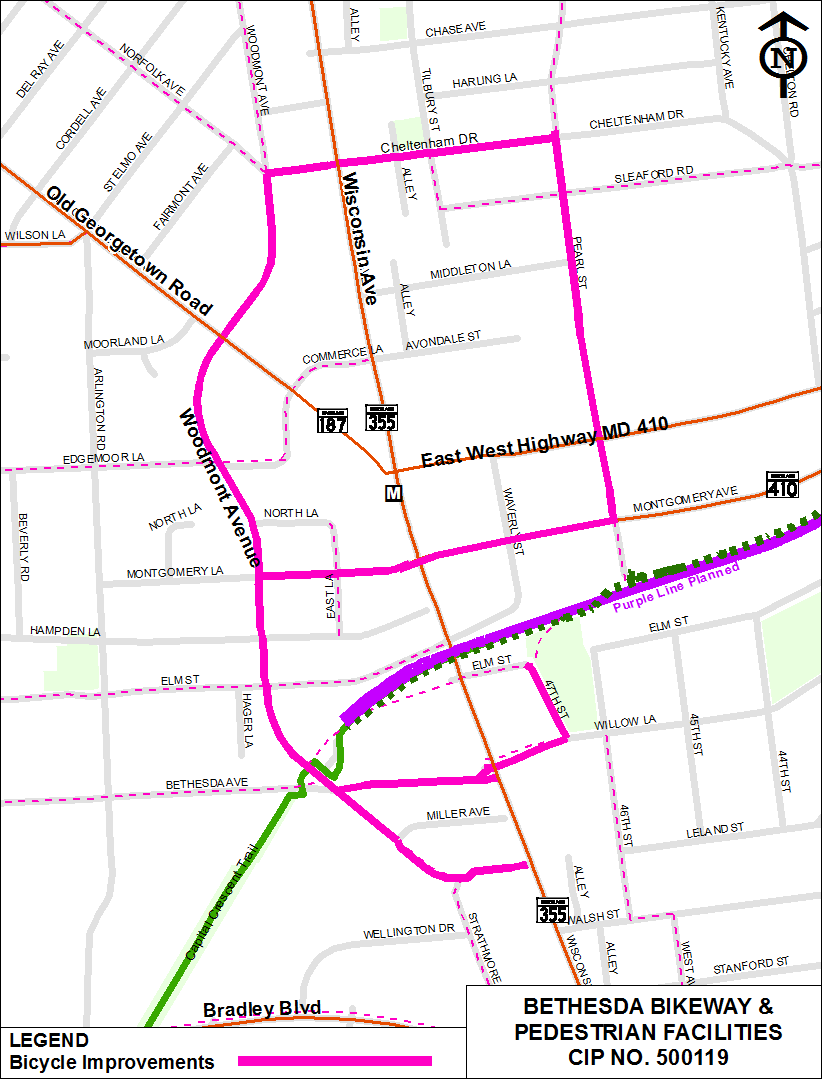
Montgomery County has completed the bikeway construction along a portion of Woodmont Avenue in Bethesda and is reopening a reconfigured “streetery.” The block was closed to traffic during the COVID-19 health crisis to allow restaurants to have expanded outdoor dining. The reconfigured streetery, which will reopen by early evening on Friday, Oct. 14, will provide extended street dining and a short-term curbside pick-up zone for businesses while reopening two of the four roadway lanes to traffic.
The Montgomery County Department of Transportation (MCDOT) has been constructing a link of the Bethesda bicycle network along Woodmont Avenue for the last few weeks, between Bethesda Avenue and Elm Street. The bikeway is separated from the roadway to protect bike riders. The cycle track is part of a new, two-way bike network in Bethesda that offers bright green, protected bike lanes. The cycle track loops around a wide stretch of Downtown Bethesda and connects to the Capital Crescent Trail.
Whether or not the streetery should remain closed to traffic as businesses returned closer to pre-pandemic status was the focus of a recent survey conducted by the County’s Bethesda Chevy-Chase Regional Services Office (BCCRS) and the Bethesda Urban Partnership. Residents and businesses were asked for feedback.
The survey overall showed that the majority of local residents expressed a desire to keep the streetery closed to cars, but local businesses differed in opinion. Business owners were concerned that a closed roadway would not allow vehicles from passing their businesses and would prevent them from being exposed to potential new customers.
“Roughly half of the businesses in Bethesda asked for Woodmont to reopen to vehicles,” said BCCRS Director Pete Fosselman. “The surveyed businesses are located in the Urban District, as well as just outside of the district. While we want to keep our streetery in place because we know how important it is to the community, we also recognize the current setup is not working as well as it could for the business community. This solution is a way to best meet the needs of all those impacted by the use of Woodmont Avenue.”
Over the last two years, orange construction blockades lined both ends of the defined Woodmont Avenue block. The space in between, once a four-lane street with heavily used street parking on both sides, was altered to include dining tables. The space allowed the restaurant-lined street to offer diners a refuge from the pandemic and helped keep some hospitality businesses afloat when indoor dining was restricted.
“The Woodmont Streetery was immensely popular during the pandemic for residents and businesses,” said County Executive Marc Elrich. “We are taking the lessons learned from the pandemic to create a better downtown Bethesda for everyone. Instead of simply going back to the pre-pandemic era, this new design is people-focused and creates an environment that supports both businesses and residents alike.”
MCDOT Director Chris Conklin said his department worked with other County offices to seek solutions for Woodmont Avenue that could work for residents and business owners.
“As a short-term solution, traffic controls have been set up to define different areas of the street. These barriers will be replaced with more appropriate planters that have been ordered and are expected to be delivered soon,” said Director Conklin. “The setup will allow for a substantial expansion of the café seating and public dining space using a portion of the roadway, will provide a curbside pickup zone and one lane of traffic in each direction. The configuration will be flexible and will let us adapt the space through the seasons and as business and public needs continue to evolve. In the longer term, we will engage the public in the permanent design of Woodmont Avenue.”
A local restauranteur and owner of Medium Rare Restaurant in Downtown Bethesda, Mark Bucher, said businesses have faced challenges with restricted traffic movements.
“Streeteries did a good job of creating safe outside dining options during the pandemic,” he said. “Pre-pandemic, people would drive down the street to check out what was happening on the block before deciding to stop in. The ability for cars to pass through drew people in and that is something we need more of. I support reopening the street. Bethesda hospitality businesses need to be drawing in new customers constantly to be able to meet the high rents and stay open. Additionally, there is nowhere for customers and commercial vehicles to load and unload as it is.”
Federal Realty Investment Trust (FRIT), which owns the buildings along Woodmont, represented its perspective in a letter to the County Executive.
“Many new industry retailers are drawing customers from a larger radius, which is part of the beauty of Bethesda Row’s success,” said FRIT Senior Vice President of Development John Tschiderer. “Being able to drive by a highly visible destination is the first and most important element of successful street retail, which is the expectation for retail stores and restaurants that front Woodmont Avenue. Woodmont Avenue is a critical part of the overall Bethesda Row roadway network. The circulation pattern allows for potential customers to loop around the streets of Bethesda Row—making visual notes of the retailers, and then to park.”
